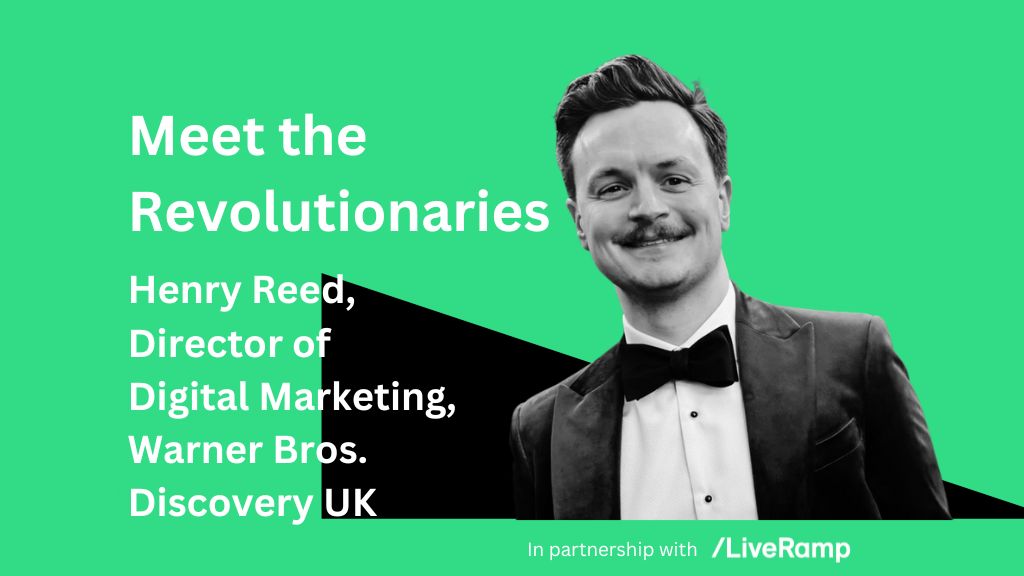New Digital Age (NDA) in association with LiveRamp is spotlighting the men and women championing a data-led revolution in the marketing industry. ‘Meet the Revolutionaries’ focuses on the efforts of the industry executives helping to push digital marketing into a new era of data collaboration.
Here, Henry Reed, Director of Digital Marketing at Warner Bros. Discovery UK explains why he believes the use of data collaboration will continue to increase “at pace”…
Tell me about your current role.
I head up the digital marketing team at WBD UK, where we look after digital marketing strategy for the ‘studios’ part of the business. It’s a huge business, incorporating Theatrical, TV, Home Ent & Games. In addition, we collaborate with our Studio Tour teams and the e-comm side of the business.
We work as a conduit between the marketing divisions and the product owners for each of those marketing campaigns, as well as working with our media agency and our organic social agency, managing our relationships with key platforms and publishers.
Basically, our job is to ensure that we are keeping the business at the forefront of digital strategies to help us maintain our competitive advantage. The media field is packed and it’s not as easy to stand out these days. I have three key disciplines within the team, covering paid media, data strategy and our organic consumer touch points.
Can you give an example of a time when you personally helped to drive innovation?
Our side of the business lacks, for the most part, a direct-to-consumer point of sale or touch point in the consumer journey. For example, cinema tickets to our films are sold by the cinemas. In this context, without transaction data to rely on, my team is constantly challenging itself and testing new ways to better measure the impact of our digital and wider marketing efforts on the business. That has involved quite a large number of data partnerships and bespoke digital strategies over the years.
A few years ago, we implemented a testing framework that links back any innovation to the heart of our business and the things we’re actually trying to achieve. It’s a cross-divisional framework, with the idea being that we can learn something from our theatrical marketing campaign that could also apply to a TV or a games marketing campaign, and vice versa. We update the framework to reflect our changing business needs, and we make sure to look beyond just paid media. We’re also thinking about how our organic social strategies can contribute towards our understanding of what drives business outcomes.
We do capture quite a lot of first-party data but, as it’s not always tied to a transaction or a natural point of sale, we have to be quite creative with how we manage the value exchange of collecting the data. e.g. via competitions.
What are the most common challenges to innovation?
There has to be an organisational readiness to test and to try new things. It’s usually quite easy to see when there is an appetite for innovation and when there isn’t.
There’s also sometimes a concern about the speed of change, where organisations don’t feel that they can move as quickly as they need to innovate. Everyone’s got their day job to concentrate on, and innovation sometimes feels like an activity that’s ‘above and beyond’ the day job. We constantly try to remind ourselves that innovation is a key part of an effective digital marketing strategy.
Another blocker to innovation, and a valid one in my opinion, is a distrust of testing or innovation purely for the sake of it. If you are testing and trying things without really having a clear objective in mind, it can be hard to deliver any real benefits.
Not every organisation has the ability and the means to innovate. I’m fortunate enough to work at Warners Bros. Discovery, where we have scale, we have lots of expertise, we have established relationships with all the big platforms and we have the means to help us be able to experiment. If you’re a startup business, or you’re having to make significant cuts to marketing budgets, it can be easy for innovation to fall by the wayside.
What tips can you offer others hoping to drive innovation?
You need a baseline of effective communication across the organisation. The various layers of stakeholders involved need to be cognizant of the idea and what it might achieve, so an effective flow of communication is the starting point. Then to build on that, you need to understand how to measure the impact of an innovation or at least get a gut feel for the impact, which makes it much easier to get sign off or approval to press ahead. If you can link an innovation project back to your strategic objectives, it feels like something which the business can buy into quite easily.
I think it’s important that people have space to actually sit and reflect on the new things they’ve done and their impact. As digital marketers, we deal with change all the time. In 2024, many of the things that are the bread and butter of our tactics are things we hadn’t heard of five years ago. In our business, nothing’s ever ‘normal’ for very long. If you can remind yourself of all the different things you’ve achieved to evolve, it gives you a feeling of empowerment that can help to fuel further innovations.
It also helps to have a fairly flat organisational structure. Enabling people at many different levels of a business to communicate with each other is a springboard for innovation, as it provides a melting pot of different perspectives and ideas.
How do you think digital marketing might evolve over the next few years?
You can’t discuss the future of marketing right now without mentioning AI and generative AI. I’m by no means an expert but it seems obvious that AI might create changes that are completely unforeseen. The impact on our society, let alone marketing, is going to be vast.
For example, when you think of all the disparate data sets that can now be securely combined and analysed in collaboration with others, who knows what sort of insights those collaborations could produce? We’ll be getting answers to questions that we previously didn’t even know to ask! So, for me, generative AI is very much a case of ‘watch this space’!
Two other areas that I would touch on are CTV and social media. CTV has very quickly moved past being something new to become a tried and trusted part of the digital marketing toolkit, but I think we’ll start to see a broader array of interactivity with CTV marketing. At the moment, things are relatively functional: you put an ad out with a call-to-action or a QR code, but there’s not much beyond that. By comparison, marketers can do a lot more on a mobile device, so I think CTV has a bit of catching up to do as a marketing platform.I also think the measurement side of CTV will continue to improve.
‘Social media’ is, for me, a slightly strange term these days. The various big platforms have become more distinct from each other over time. Yes, all these platforms require someone to log in, create a profile, and connect to people in different ways, but they’ve evolved to become very different things.
Reddit, for example, is a community forum, in a way a proper throwback to the early days of the Internet. However, it’s also increasingly used as a search engine, to the extent that Google is currently working with Reddit to plug-in that search functionality. Then you’ve also got something like Tiktok, primarily a video sharing platform, which has also become a player in search and the ecommerce marketplace.
As marketers, we need to approach each platform in more of a bespoke way, because the creative environment, the experience for the consumer, and what can be achieved are all wildly different depending on the platform being used.
Do you think ‘data collaboration’ will become more important to marketers?
I was hoping to get through this conversation without mentioning the word ‘cookie’! But here we are in 2024 still talking about them. We’re now seeing so many different solutions out there that aim to provide effective targeting without the need for a third-party identifier.
The use of data collaboration is growing and I think it’s going to continue growing at pace. There’s a renewed focus on first-party data. There’s so much focus on brands having closer relationships with their consumers, and data collaboration is a key way to help enable that and to create scale beyond your own consented user data. Look at the rise of retail media, for example.
However, it’s really important that any data collaboration needs to be fully compliant with the various laws and regulations surrounding consumer data. Five years ago, a digital marketing team within a business operated in isolation a lot of the time. Today, you are far more likely to be speaking to legal teams and data teams on a regular basis. The organisations that will benefit most from data collaboration will be the ones that successfully plug all their different internal stakeholders into the conversation.






